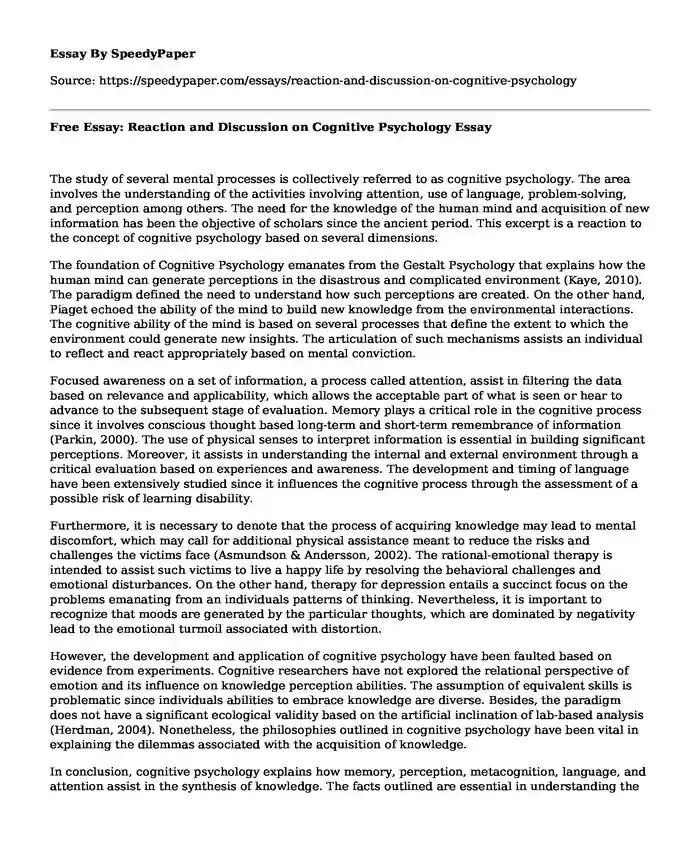
| Type of paper: | Essay |
| Categories: | Psychology |
| Pages: | 3 |
| Wordcount: | 602 words |
The study of several mental processes is collectively referred to as cognitive psychology. The area involves the understanding of the activities involving attention, use of language, problem-solving, and perception among others. The need for the knowledge of the human mind and acquisition of new information has been the objective of scholars since the ancient period. This excerpt is a reaction to the concept of cognitive psychology based on several dimensions.
The foundation of Cognitive Psychology emanates from the Gestalt Psychology that explains how the human mind can generate perceptions in the disastrous and complicated environment (Kaye, 2010). The paradigm defined the need to understand how such perceptions are created. On the other hand, Piaget echoed the ability of the mind to build new knowledge from the environmental interactions. The cognitive ability of the mind is based on several processes that define the extent to which the environment could generate new insights. The articulation of such mechanisms assists an individual to reflect and react appropriately based on mental conviction.
Focused awareness on a set of information, a process called attention, assist in filtering the data based on relevance and applicability, which allows the acceptable part of what is seen or hear to advance to the subsequent stage of evaluation. Memory plays a critical role in the cognitive process since it involves conscious thought based long-term and short-term remembrance of information (Parkin, 2000). The use of physical senses to interpret information is essential in building significant perceptions. Moreover, it assists in understanding the internal and external environment through a critical evaluation based on experiences and awareness. The development and timing of language have been extensively studied since it influences the cognitive process through the assessment of a possible risk of learning disability.
Furthermore, it is necessary to denote that the process of acquiring knowledge may lead to mental discomfort, which may call for additional physical assistance meant to reduce the risks and challenges the victims face (Asmundson & Andersson, 2002). The rational-emotional therapy is intended to assist such victims to live a happy life by resolving the behavioral challenges and emotional disturbances. On the other hand, therapy for depression entails a succinct focus on the problems emanating from an individuals patterns of thinking. Nevertheless, it is important to recognize that moods are generated by the particular thoughts, which are dominated by negativity lead to the emotional turmoil associated with distortion.
However, the development and application of cognitive psychology have been faulted based on evidence from experiments. Cognitive researchers have not explored the relational perspective of emotion and its influence on knowledge perception abilities. The assumption of equivalent skills is problematic since individuals abilities to embrace knowledge are diverse. Besides, the paradigm does not have a significant ecological validity based on the artificial inclination of lab-based analysis (Herdman, 2004). Nonetheless, the philosophies outlined in cognitive psychology have been vital in explaining the dilemmas associated with the acquisition of knowledge.
In conclusion, cognitive psychology explains how memory, perception, metacognition, language, and attention assist in the synthesis of knowledge. The facts outlined are essential in understanding the complexity of learning and the capacity of the mind in comprehending and applying the transformed data within specific environments. However, critical observations have been associated with cognitive psychology, which calls for more evidence-based research.
References
Asmundson, G. J. G., & Andersson, G. (2002). Cognitive behaviour therapy: Publication trends and future directions. Cognitive Behaviour Therapy, 31(1), 37.http://doi.org/10.1080/16506070252823607
Herdman, P. (2004). Erratum to cognitive psychology, volume 48, number 1. Cognitive Psychology, 48(3), 368. http://doi.org/10.1016/j.cogpsych.2003.12.001Kaye, H. (2010). Cognitive psychology (2nd ed.). Milton Keynes: Open University.
Parkin, A. J. (2000). Essentials of cognitive psychology. Philadelphia, PA: Psychology Press.
Cite this page
Free Essay: Reaction and Discussion on Cognitive Psychology. (2019, Oct 11). Retrieved from https://speedypaper.com/essays/reaction-and-discussion-on-cognitive-psychology
Request Removal
If you are the original author of this essay and no longer wish to have it published on the SpeedyPaper website, please click below to request its removal:
- Business Management and Finance Essay Sample
- Essay Example on PR Failures Case Studies
- Free Essay: Jonathan Livingstone Seagull and Allegory of the Cave
- Essay Sample: Lessons Learned from Joe Gebbia Story
- Response Essay Example to "Mother Tongue" by Amy Tan
- Free Essay Sample - Business Organization Culture
- Examining Drug and Substance Abuse as a Social Problem: Essay Sample
Popular categories




